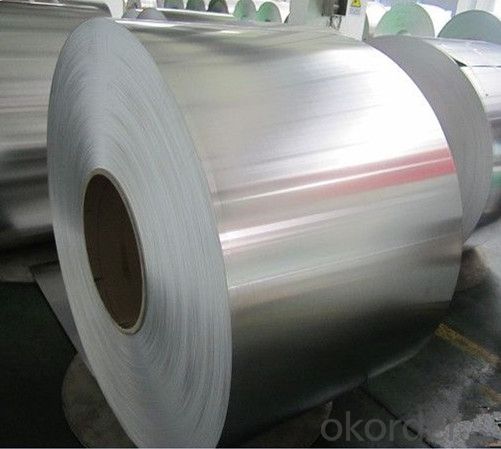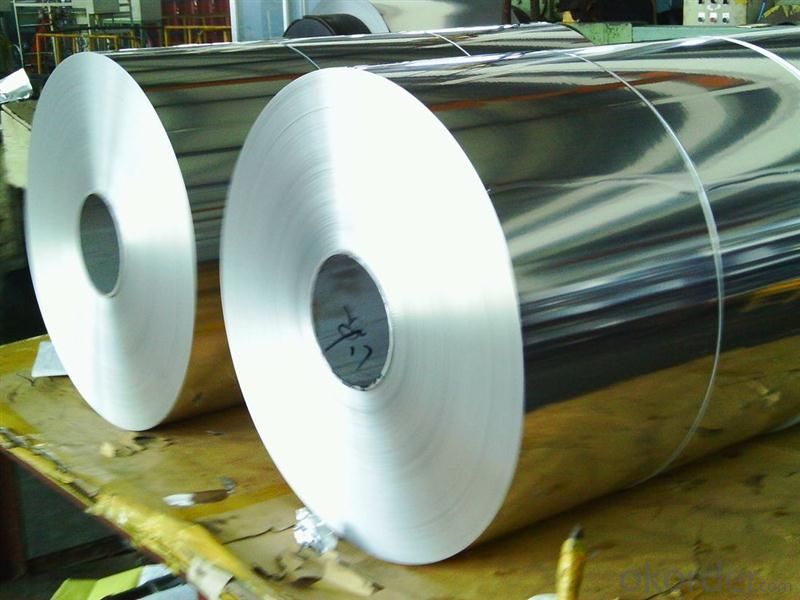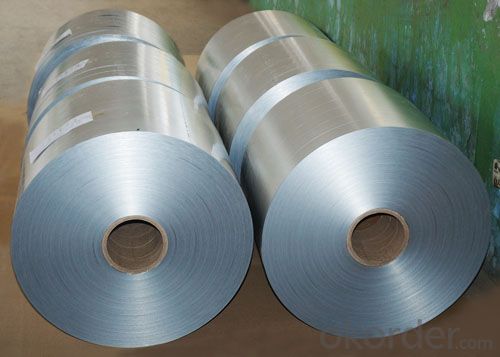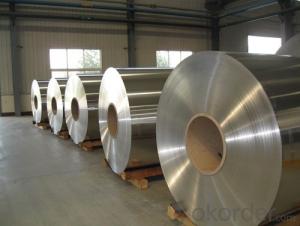1100 5052 Mirror Cost Insulation Aluminum Roll
- Loading Port:
- Shanghai
- Payment Terms:
- TT OR LC
- Min Order Qty:
- 5 m.t.
- Supply Capability:
- 6000 m.t./month
OKorder Service Pledge
OKorder Financial Service
You Might Also Like
Item specifice
1100 5052 Mirror Cost Insulation Aluminum Roll
Applications:
Aluminum foil roll is widely used in construction,decoration,hardware,
electric appliances,machinery and other industrial and civil purposes,
such as electronic capacitor,composite cooker,rice cooker,refrigerator,
computer casting,telecommunication,equipment,lamp shade,air conditioner,
cosmetics cover and so on.
Or it can be made as customers’ requirement.
Specifications
color aluminum coil
1000 series 1100 10160 1200
surface could be: Brushed, drawing, embossed, printing
color: red,
color aluminum coil
.Alloy type: 1050/1060/1100/1350
2.Temper: H16, H18, H22, H24
3.Thickness range: 0.1mm-4mm
4.Width range: 25mm-1600mm
5.Surface:finish: bright & smooth surface, without flow lines, slight oiled to avoid white rusting.
6.Quality material:totally free from such defefects as roll marks, edge damager, camber, white rust, oil patches, holes, break lines,
color aluminum coil
Name |
color aluminum coil |
Alloy or not | yes |
Alloy | 1100H16/18, 3003H24,3003H26,3005H26,8011,3004,3105,5005,etc. |
Thickness | 0.1-4mm |
Width | ≤1600mm |
MOQ | 5T |
Coating finish | Brushed, drawing, embossed, printing |
Color | As to code RAL |
Surface | Embossed,Mill Finish,Coated,Brushed |
Gloss | 10-90%(EN ISO-2813:1994) |
Total coating thick | PVDF27 ~35micron |
Polyester18~27micron(EN ISO-2360:1995) | |
Coating hardness | 2H |
Adhesion | 5B (EN ISO-2409:1994) |
Impact resistance | No cracking and peeling (A.S.T.M D2794-1993) |
Flexibility (T-bend) | 0T- 2T |
MEK resistance | 100 |
Certification | ISO9001:2000, CE, SGS |
Coil's standard diameter | 1100mm |
Inner Diameter | 405mm/505mm |
Coil's standard weight | 2000kgs |



- Q:Can aluminum coils be used for thermal insulation purposes?
- Thermal insulation purposes cannot be fulfilled by aluminum coils, as it is a metal with high thermal conductivity, facilitating heat transfer. Consequently, instead of preventing it, utilizing aluminum coils as thermal insulation would actually facilitate the transfer of heat. To achieve effective thermal insulation, materials such as fiberglass, foam, or mineral wool, which possess low thermal conductivity, are commonly employed. These materials establish a barrier that restricts heat transfer, thereby maintaining the desired temperature within a given space.
- Q:What are the safety precautions required when handling aluminum coils?
- When handling aluminum coils, there are several safety precautions that should be followed to ensure the safety of individuals and minimize the risk of accidents. 1. Personal Protective Equipment (PPE): It is essential to wear appropriate PPE, including safety glasses or goggles, gloves, and steel-toed boots. This equipment provides protection against potential injuries caused by sharp edges or flying metal particles. 2. Proper Lifting Techniques: Aluminum coils can be heavy, so it is important to use proper lifting techniques to avoid strains or back injuries. Always lift with your legs, not your back, and use lifting aids or equipment when necessary. 3. Secure Storage and Handling: Store aluminum coils in a well-ventilated area that is free from excessive heat or moisture. It is important to stack them properly and securely to prevent them from falling or rolling, causing injury to nearby individuals. 4. Fire Prevention: Aluminum is highly flammable when in the form of a fine powder or shavings. Therefore, it is crucial to keep the working area clean and free from combustible materials. Additionally, smoking or open flames should be strictly prohibited in the vicinity. 5. Avoid Sharp Edges: Aluminum coils can have sharp edges that can cause cuts or lacerations. Always handle them with care and use appropriate tools or equipment when cutting or shaping the coils to minimize the risk of injury. 6. Training and Education: Proper training and education on handling aluminum coils should be provided to all individuals involved in the process. This includes understanding the material properties, safe handling techniques, and emergency procedures in case of accidents or spills. 7. Chemical Hazards: Aluminum coils may be coated or treated with chemicals. It is important to be aware of any potential hazards associated with these coatings and follow proper safety procedures when handling or working with them. By following these safety precautions, individuals can reduce the risk of accidents, injuries, and potential hazards when handling aluminum coils. It is crucial to prioritize safety and ensure that all employees are trained and equipped with the necessary knowledge and protective gear.
- Q:What are the different coil handling options available for aluminum coils?
- There are several coil handling options available for aluminum coils, depending on the specific requirements and preferences of the user. Some of the commonly used options include: 1. Coil Cradles: These are horizontal racks or frames on which the aluminum coils are placed. They provide support and stability to the coils during storage or transportation. Coil cradles are available in various sizes and designs to accommodate different coil dimensions. 2. Coil Cars: Coil cars are mobile platforms equipped with lifting mechanisms that allow for easy movement of aluminum coils. They are commonly used in manufacturing facilities where coils need to be transported between different processing stations. Coil cars can be manually operated or automated, depending on the level of automation desired. 3. Coil Turnstiles: Coil turnstiles are rotating devices that hold multiple coils vertically. They allow for easy access to individual coils without the need for heavy lifting or rearranging. Coil turnstiles are ideal for high-volume production environments where quick coil changeovers are required. 4. Coil Upenders: Coil upenders are specialized equipment used to rotate or flip aluminum coils to change their orientation. This is particularly useful when a coil needs to be loaded or unloaded from a vertical position, or when certain processes require a specific coil orientation. 5. Coil Lifters: Coil lifters are a type of lifting device specifically designed to handle aluminum coils. They typically feature adjustable arms or clamps that securely grip the coil, allowing for safe and efficient lifting. Coil lifters come in various configurations, including manual, semi-automatic, and fully automated models. 6. Coil Tippers: Coil tippers are used to tilt or incline aluminum coils for various purposes, such as facilitating coil feeding into processing machines or enabling easier coil inspection. They can be operated manually or powered by hydraulic or pneumatic systems. 7. Coil Stackers: Coil stackers are used to neatly stack and store aluminum coils vertically. They typically feature adjustable arms or forks that can be raised or lowered to accommodate different coil sizes. Coil stackers help optimize storage space and ensure easy access to coils when needed. These are just a few examples of the coil handling options available for aluminum coils. Each option offers its own advantages and may be suitable for different applications or industries. It is important to carefully consider the specific requirements and constraints before selecting the most appropriate coil handling solution.
- Q:What are the common surface finishes for aluminum coils in the electrical industry?
- The common surface finishes for aluminum coils in the electrical industry include mill finish, anodized finish, and painted finish.
- Q:What is the density of aluminum coils?
- The density of aluminum coils can vary depending on their size, shape, and composition. However, the average density of aluminum is around 2.7 grams per cubic centimeter (g/cm³). This means that for every cubic centimeter of aluminum coil, it weighs approximately 2.7 grams. It's important to note that the density can differ slightly based on factors such as impurities or alloying elements, but the average value provides a good estimate for the density of aluminum coils.
- Q:should i have a paper between aluminum siding and the wood
- Aluminum siding can be vented with round pop-in perforated vent plugs, these are very easy to install. I would really like to know how do you know there is condensation behind your siding?
- Q:Yep a slogan...the element Aluminum
- Aluminum, unlucky # 13. or...Aluminum, fun to say-hard to chew. Aluminum says, stop staring at my cans. I 3 recycling.
- Q:What is the typical coil diameter for aluminum coils?
- The diameter of aluminum coils can differ based on the particular application and industry needs. Generally, aluminum coils possess a diameter spanning from 12 to 72 inches. The precise diameter is determined by several factors including the thickness of the aluminum sheet, desired coil weight, and the processing and handling equipment employed. Various industries like automotive, construction, and packaging might have specific coil diameter requirements tailored to their distinctive manufacturing processes and end-use demands.
- Q:What are the bending and forming capabilities of aluminum coils?
- Aluminum coils have excellent bending and forming capabilities due to the inherent properties of aluminum as a malleable and ductile material. Aluminum is known for its high strength-to-weight ratio, which allows it to be easily shaped and formed without compromising its structural integrity. When it comes to bending, aluminum coils can be bent into various shapes and angles without fracturing or cracking. The flexibility of aluminum allows it to be formed into tight curves or gentle bends, making it suitable for a wide range of applications. This flexibility is particularly advantageous in industries such as construction, automotive, and aerospace, where curved or complex shapes are often required. In terms of forming, aluminum coils can be easily manipulated into different forms, including flat sheets, tubes, or intricate profiles. This versatility makes aluminum coils highly sought after in industries where customization and design flexibility are important. Furthermore, aluminum coils can undergo various forming processes such as roll forming, stamping, and deep drawing, allowing them to be transformed into different products with precise dimensions and tolerances. These forming capabilities make aluminum coils a preferred choice for manufacturing components, such as automotive body panels, roofing materials, heat exchangers, and structural elements. Overall, the bending and forming capabilities of aluminum coils are exceptional, making them an ideal choice for applications that require flexibility, durability, and design versatility.
- Q:Can you create a tank, AFV, IFV etc. from aluminium or is this just a stupid idea that would kill everyone inside?
- Most military vehicles these days are made out of a super high grade strength linoleum. That way, if they're ever needed to be lifted out by a helicopter or some other flying vehicle, they're light enough. And it also is easier to repair damage and clean off blood stains as compared to other types of metal.
1. Manufacturer Overview |
|
|---|---|
| Location | |
| Year Established | |
| Annual Output Value | |
| Main Markets | |
| Company Certifications | |
2. Manufacturer Certificates |
|
|---|---|
| a) Certification Name | |
| Range | |
| Reference | |
| Validity Period | |
3. Manufacturer Capability |
|
|---|---|
| a)Trade Capacity | |
| Nearest Port | |
| Export Percentage | |
| No.of Employees in Trade Department | |
| Language Spoken: | |
| b)Factory Information | |
| Factory Size: | |
| No. of Production Lines | |
| Contract Manufacturing | |
| Product Price Range | |
Send your message to us
1100 5052 Mirror Cost Insulation Aluminum Roll
- Loading Port:
- Shanghai
- Payment Terms:
- TT OR LC
- Min Order Qty:
- 5 m.t.
- Supply Capability:
- 6000 m.t./month
OKorder Service Pledge
OKorder Financial Service
Similar products
New products
Hot products
Hot Searches
Related keywords




























